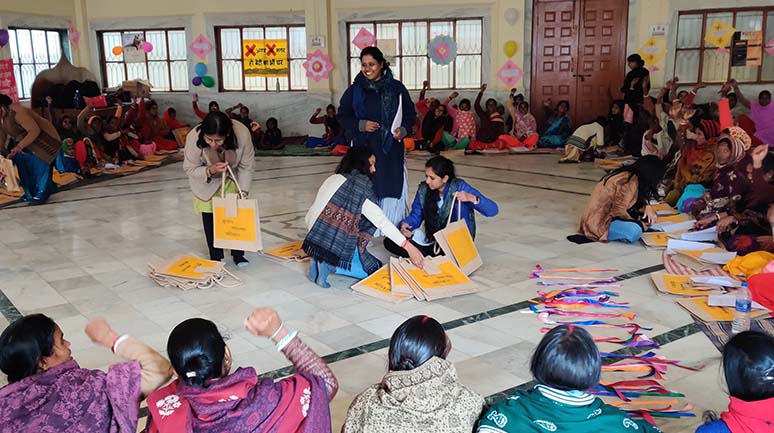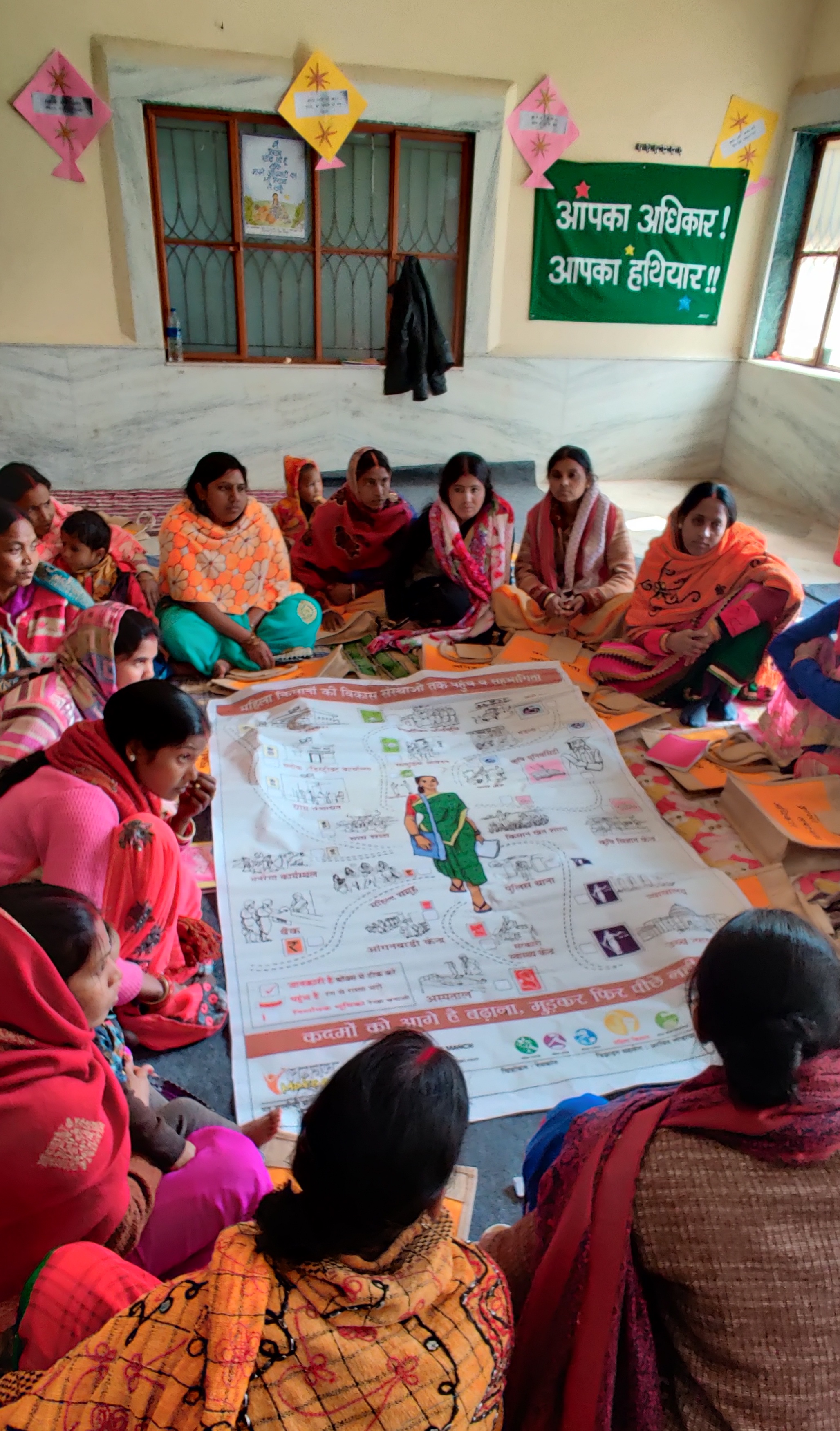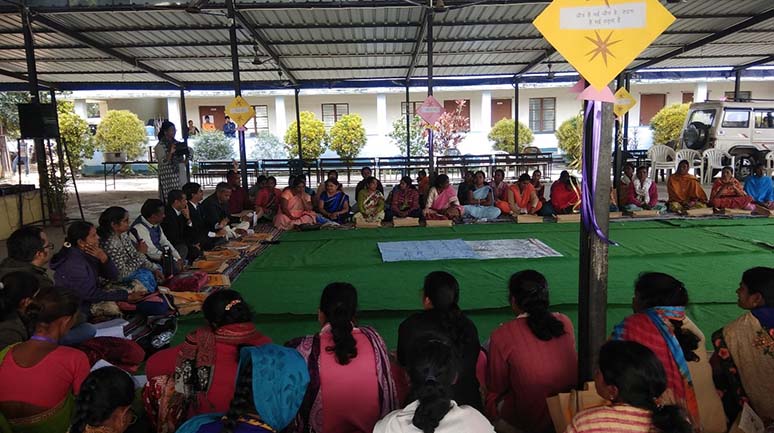Mujhe Nyay Chahiye, Paise Nahin : A Collective’s Fight for Justice

Building awareness of the rights women have to a life of dignity and one free of violence, and helping them speak up against the violation, not just their physical bodies but also of their dignity, found its first success when the women en masse voiced their opposition to the ‘justice’ meted out to them by the traditional village justice mechanism. A beginning has been made…

The Gender Responsive Organisations for Women (GROW) team welcoming participants in one of the gender learning camps
Overview
T he pervasiveness of various forms of violence against women in different parts of the world is well- documented by now. Jharkhand is no exception, with rampant domestic violence, sexual abuse, torture, dowry, trafficking and witchcraft (Kumar, 2019). A scoping study conducted by the authors in Thethaitangar block, Simdega district ((the location of this case study, with a large tribal population) in Jharkhand reveals similar trends. The Policy and Protocols for Gender Mainstreaming and Social Action under NRLM was introduced in late 2018 in Jharkhand. This partnership between Jharkhand State Livelihood Promotion Society (JSLPS) and three civil society organizations aims to develop a prototype to scale the policy in Jharkhand. This case study illustrates how members of one of the early Cluster-level Federation–Social Action Committees (CLF–SACs), led by two Block Resource Persons (BRPs), all women, took up a case of rape for the first time. They stood in solidarity with the survivor; her Village Organization (VO) resisted the decision taken by the traditional panchayat and helped her access legal redressal. The SAC was formed in 2019, and gender-based training programmes were introduced from January 2020 onwards.
There is emerging evidence from the Society for Elimination of Rural Poverty's (SERP's) experience of the strength of the collective, and the role of the SAC as a source of support, a mechanism of active intervention that ensures speedy and effective justice related to violence against women (Vindhya & Lingam, 2019). This case study identifies some systemic barriers that need to be overcome, and demonstrates how the Gender Mainstreaming Policy and Protocols can do so effectively in the context of Jharkhand.
The Case Study
Kusum (name changed), a newly married woman, was returning from her parental village in Simdega to her husband’s village in Rengarih. She was travelling in a Tata Magic vehicle, a regular form of taxi-transport in the area. The other passengers were dropped off and Kusum was alone with the driver. They had to travel through a dense forest and a deserted patch along the way. The driver stopped the vehicle, pulled her into the jungle and raped her. The driver also threatened to harm her if she reported this to anybody. Kusum described how she was scared for her life, and that her mind was overrun by doubts about whether her husband would believe her or not, and whether he would accept her back or not. She remained silent when she reached home; she was very troubled and restless and finally confided in her husband the next day. Although her husband believed her, he blamed her for travelling alone. He wanted to confront the driver, a member of the Teli (an Other Backward Caste) community. On second thoughts, the Chik-Baraik (one of the 32 Schedule Tribes in Jharkhand) couple approached their gram panchayat mukhiya (head), a Chik-Baraik-woman. As was the tradition, she convened a meeting of the Oraon elders, or the panch, (the Oraon tribe is in the majority there) in the village council ( panchayat ). All the panchayat members (barring the mukhiya) were men.
What was different about this incident in comparison to earlier such incidents?
Community norms in adivasi regions frequently uphold patriarchal structures and define women as inferior to men, assign them a subordinate status within the community and cut them off from the individual rights enjoyed by women in other sections of society. Community norms may be organized in ways that deny women any voice in decision-making forums. Just because women within these communities fail to exercise their ‘voice’ by protesting against gender injustice, they cannot be deemed to have consented to their subordinate status in the community (Kabeer et al, 2019). Tensions between group rights, which allow historically marginalized communities some measure of self-governance in determining their own rules and norms, and the rights of the marginalized subgroups, such as women, within these communities are now being recognized. In this case, the SAC training helped women to break this silence.
The members were discussing the incident when their trainer, also an author of this case, entered the session. He encouraged them to critically reflect on the case, especially because the panchayat did not allow women to enter the meeting, saying “Ye mahilaon ka kaam nahin hai, aap log jaayiye (This is not for women, go away)!”
The members of the CLF-SAC were participating in the third phase of their training programme, dedicated to building critical consciousness on and the tools to combat violence against women. Within the same premises, the panchayat was holding its meeting to determine what should be done in Kusum’s case. The members were discussing the incident when their trainer, also an author of this case, entered the session. He encouraged them to critically reflect on the case, especially because the panchayat did not allow women to enter the meeting, saying “Ye mahilaon ka kaam nahin hai, aap log jaayiye (This is not for women's work, go away)!”
The village elders discussed the matter from 10 am to 2 pm. In the gram sabha-like public meeting, the rape victim had to reiterate the incident not once or twice but many times till all were convinced about it. She had to answer all sorts of questions that hurt her dignity. Rather than escalate the case to the police, they adjudicated the case in the traditional way: they identified the driver and asked him to compensate the woman and her family by offering Rs 50,000 as a token of seeking forgiveness. This is how such issues were handled by the Oraon community, and the women never raised their voice against this. Not till then.

SHG members identifying the institutions that they can easily access during a gender learning camp
K usum and some of the women SHG members in her neighbourhood, who were called to the meeting to be told of the panchayat’s decision, were very upset with the verdict. For the first time, however, they had a place to go, to share their dissatisfaction. The SHG members we interviewed said that the violation and disrespect of their daughters and daughters-in-law could not be settled by naming a price such as Rs. 50,000 for it.
“Kab tak hum apne bahu-betiyon ki izzat ko paise se bechte rahenge? Aaj hamari bahu ke saath hua hai kal hamari betiyon ke saath hoga, to kya hum dekhte rahenge? (How long we will keep on taking money to settle matters like rape? Today it has happened to our daughter-in-law, tomorrow it will happen to our daughters; will we just watch and do nothing then?)” said Seema (name changed), a BRP.
They were also very upset because the driver had committed similar crimes earlier and had got away with it in a similar manner. They decided that they would not let him go so easily and that they would fight for justice. They came back to the training hall to inform the CLF-SAC members about the decision. The trainer at this point asked the CLF women participants if they were willing to move beyond the concepts being discussed in the training, and take a stand in solidarity with Kusum. The women unanimously decided to stand with Kusum. To support her, they also wanted legal redressal. They had just learnt about this in their training programme and the two BRPs present, Sushila and Seema (names changed), took the lead. They encouraged all the women present to join them. They walked en masse to where the panchayat had gathered and presented the women’s rejection of the financial settlement for Kusum, pushing for legal redressal. The village elders realized that the matter was not getting settled, and the mukhiya gave them permission to lodge a First Information Report (FIR) at the police station.
Barriers in the institutional ecosystem
None of the BRPs or the women had been to a police station before, and neither had they ever lodged a complaint nor an FIR. They were hesitant and fearful. The Gender Responsive Organization for Women (GROW) coordinator from PRADAN, who was imparting the training there, then coordinated with the State Rural Livelihoods Mission (SRLM). The District Manager-Social Development (DM-SD) talked to the Deputy Superintendent of Police (DySP) seeking their support. Led by the BRPs, all the CLF members, and the VO members from Kusum’s village went to the police station. The trainer and Block Project Manager (BPM) accompanied them. The CLF paid for two autos to transport the women there and assured the victim of financial help to bear the costs of the legal procedure.
The police stalled the process of filing the FIR by pretending it would take 5-6 hours. The women sat and waited there. They called the DM-SD again for guidance, and got the District Collector’s (DC’s) number. The women informed the DC about the incident and they also called the State Program Manager-Social Development (SPM-SD) in Ranchi. The SPM was very supportive and immediately informed the Secretary, Rural Development, and pressure was created on the local police. Finally, the FIR was lodged in the evening, around 6 pm.
This support gave Kusum the strength to demand justice, despite all odds; as she said, “Mujhe nyay chahiye paise nahin (I want justice not money,).” The BRPs and CLF–SAC members accompanied Kusum for the medical examination to establish that rape had occurred and a court hearing was scheduled. The police arrested the accused. However, the police also identified the two BRPs, who had complained about them to their higher authorities. The BRPs reported being humiliated by the police in the station and, once the case was closed, the two BRPs started receiving violent threats. In fact, one morning, the police entered the house of one of the BRPs saying that they had come to investigate and picked up well grown kadaknath chicken and took it away. However, that kadaknath was rescued from the police by the efforts of the SHG didi’s.
Takeaways
When we asked Seema about her experience of the incident she said, “I tried to work with sahanshilta (forbearance) and courage. If women show courage, society can change for the better, in a planned and informed manner. More women need support to share their problems with one another and participate in training programmes for their own benefit and growth.”
Although the collectives and the BRPs have critical consciousness, the tools and the knowledge now; as well as a supportive institutional eco-system in SRLM and CSOs, navigating local law enforcement systems that are not sensitive to women’s fight for justice makes it very hard.
Both BRPs reported becoming more courageous, confident and independent after undergoing various gender training processes. The trainings gave them the tools for the first time to take action, to support those women who are the victims of violence. Both the BRPs and the CLF leaders expressed their gratitude for the presence of the trainer and the BPM. They said, “Our trainer and the BPM accompanied us, which is why we were able to take action so fearlessly,” The trainer and the BPM stood alongside the women, supporting them and not taking the lead. They supported them with their presence and guidance when the women were confused and provided them information as and when required. The women leaders, who were taking such a step the first time, drew courage from their presence.

The women's collective members attending a gender learning camp addressed by the Secretary of the Districts Legal Services Authority (DLSA)
Although the collectives and the BRPs have critical consciousness, the tools and the knowledge now, as well as a supportive institutional eco-system in SRLM and CSOs, navigating local law enforcement systems that are not sensitive to women’s fight for justice makes it very hard. The conceptual and empirical advances in understanding the role of the collective in facilitating effective justice related to violence against women are supported through partnerships between the NRLM and NGOs such as PRADAN, Jagori and TRIF. This is not enough, however. The collective’s quest for gender justice needs to be supported by a responsive, local-level institutional system of delivery of justice to women.

